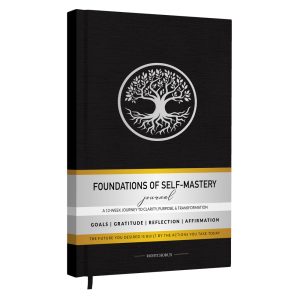Mindfulness journal prompts are one of the most accessible and transformative tools for deepening daily self-awareness.
Whether you’re navigating stress, chasing clarity, or simply want to feel more grounded, these prompts offer a gateway to presence and inner peace.
Even the busiest minds—those juggling careers, caregiving, or creative pursuits—can make space for mindfulness by dedicating just a few intentional minutes each day with pen and paper.
This blog will explore the power of mindfulness journaling and share targeted prompts for emotional clarity, gratitude, and self-discovery.
If you’ve ever felt overwhelmed with where to start, the Foundations of Self-Discovery Mastery Journal is thoughtfully designed to guide you.
With structured reflection pages and integrated prompts, it makes your mindfulness practice more consistent, meaningful, and achievable—one page at a time.
Foundations of Self Discovery & Mastery Journal: A 13-Week Personal Development Journal System
$29.95
The Foundations of Self Discovery…
Table of Contents
The Power of Mindfulness Journal Prompts
Mindfulness journal prompts are more than questions—they’re daily invitations to sit in quiet awareness and reconnect with yourself.
Rooted in present-moment reflection, these prompts help shift your attention from reactivity to intentional inquiry.
By regularly writing responses to these types of questions, you’re training your brain to respond with awareness instead of autopilot habits.
Scientific studies have shown that journaling can improve emotional regulation, lower anxiety levels, and build stronger neural pathways associated with self-control.
These findings are significant, especially in a world filled with noise and distraction.
Mindfulness journaling encourages a slower pace—not as a form of withdrawal, but as an act of fierce presence.
Over time, using mindfulness journal prompts daily can transform self-awareness into a steady trait, rather than a fleeting state.
Here’s why making this part of your routine matters:
- Enhances focus by redirecting mental energy toward the now
- Boosts mood by increasing awareness of joyful and subtle moments
- Strengthens emotional regulation by labeling and understanding inner experiences
- Enables pattern recognition by tracking thoughts, triggers, and behavioral loops over time
Why Mindfulness Journaling Matters
Using mindfulness-driven prompts like, “What am I feeling in this very moment?” encourages cognitive presence and emotional literacy.
By naming what you’re experiencing, you’re disrupting mental loops of negativity or anxiety.
Research from UCLA confirms this—simply labeling emotions can reduce activity in the amygdala, the brain’s stress center, and promote clarity.
Journaling is also a mindful act in itself. The practice of writing slows the mind and sharpens perception.
As your hand moves across the page, your thoughts sync with sensation, bringing body and mind together into one focused rhythm.
This means that even five minutes of responding to a mindfulness prompt can offer a profound return on investment.
Creating a Daily Ritual with Journal Prompts
Consistency is where mindfulness journaling goes from interesting to transformative.
Like brushing your teeth or stretching each morning, the real magic of these prompts is in the repetition.
In just a few lines a day, you create a touchstone that realigns your inner compass before you return to the demands of life.
Try incorporating prompts like:
- “What am I feeling in this very moment?”
- “What triggered recent stress or joy, and why?”
- “What thought or belief kept resurfacing today?”
- “What part of today did I experience most mindfully?”
Even brief answers unlock heightened emotional awareness—and when done consistently, these short entries help build self-connection that’s long-lasting.
Foundations of Self Discovery & Mastery Journal: A 13-Week Personal Development Journal System
$29.95
The Foundations of Self Discovery…
How the Foundations of Self-Discovery Mastery Journal Enhances Mindfulness

Mindfulness journaling often starts with good intentions but loses momentum due to lack of structure or direction.
That’s where a guided tool like the Foundations of Self-Discovery Mastery Journal can turn scattered attempts into a sustainable practice.
Designed with mindfulness journal prompts built into each day, this immersive 13-week journal simplifies self-reflection without compromising its depth.
Instead of wondering what to write, each page walks you through a gentle yet powerful framework.
With consistent journaling in both the morning and evening, you build a steady rhythm that gradually increases clarity, peace of mind, and emotional resilience.
- Thoughtful daily structure: 6 mindful sections per day guide your reflections thoughtfully.
- Curated prompts: Every day features a unique quote-question-affirmation system.
- Flexible consistency: Built-in features make momentum easier to sustain.
- Holistic closure: Ritualized end-of-journey pages reinforce growth and intention.
A Guided Structure for Self-Awareness
Each day in the journal contains six devoted spaces: Today’s Goal, Today’s Affirmation, Gratitude, What Went Well, What to Improve, and Tomorrow’s Next Step.
This micro-reflection structure ensures that even when you feel overwhelmed, mindfulness stays within reach.
There’s also a Foundations of Self-Mastery worksheet at the very start that lays out your intentions and values—making sure your journey starts with clarity.
The combination of open reflection and guided structure enhances your ability to dive deeper and more meaningfully.
From Distraction to Clarity: What Makes This Journal Unique
What sets this journal apart is the built-in accountability and encouragement found in its layout.
For those who struggle with open-ended writing, the combination of inspiring quotes, mindfulness journal prompts, and daily affirmations makes the process non-intimidating.
Features like cross-referenced notes and “Letter to My Future Self” pages allow you to see how far you’ve come while staying anchored in the now.
Whether you’re new to journaling or deepening an existing practice, this journal offers professional-grade structure in a personal, reflective container.
Foundations of Self Discovery & Mastery Journal: A 13-Week Personal Development Journal System
$29.95
The Foundations of Self Discovery…
Mindfulness Journal Prompts for Emotional Clarity
We all experience emotions that catch us off guard or trigger reactions we don’t fully understand.
Using mindfulness journal prompts to explore those emotional undercurrents can bring light to hidden patterns.
Just like tracking your food or exercise, regularly reflecting on your emotional reactions helps you master your inner world instead of being ruled by it.
These prompts are especially helpful when life feels chaotic.
Once you begin labeling what you feel and untangling the deeper cause, emotional overwhelm starts shifting into self-awareness.
It’s not about eliminating emotions—but transforming your relationship with them.
- Clarifies hidden emotions and unmet needs
- Identifies thought patterns that cause emotional reactivity
- Fosters emotional balance by encouraging healthy expression
- Promotes inner healing through compassionate awareness
Identifying Emotional Triggers Through Journaling
Recognizing triggers through mindfulness journaling often begins with noticing patterns in daily responses.
Prompts like “What emotion have I been avoiding lately?” or “What’s beneath my recent irritability?” turn instinctive reactions into conscious inquiry.
By regularly acknowledging these triggers, you reduce their unconscious power.
Journaling gives you distance to observe and respond versus react unchecked. It also boosts your emotional vocabulary—key to strong relationships and responsible self-expression.
Prompts to explore include:
- “What emotion keeps surfacing this week?”
- “What need is this emotion pointing me toward?”
- “What situations tend to escalate my stress?”
- “How did I respond emotionally today, and was it helpful?”
Building Self-Compassion One Page at a Time
Self-compassion isn’t about self-indulgence—it’s about inner kindness that allows sustainable growth.
Mindful journaling can help reframe challenging moments with gentleness.
For example, when you write, “Where can I be more forgiving toward myself today?” it invites you to question your critical habits with grace.
This act eases inner conflict and improves emotional regulation.
Studies from Dr. Kristin Neff’s work on self-compassion confirm that people who treat themselves kindly bounce back from setbacks more quickly and enjoy better well-being overall.
Try these prompts:
- “What do I need to hear from myself today to feel supported?”
- “When did I judge myself unfairly, and why?”
- “What would I say to a friend in the same situation?”
- “How am I already doing better than I realize?”
Foundations of Self Discovery & Mastery Journal: A 13-Week Personal Development Journal System
$29.95
The Foundations of Self Discovery…
Mindfulness Journal Prompts to Cultivate Gratitude

Gratitude is one of the fastest paths to elevated awareness and emotional resilience.
Incorporating gratitude into your mindfulness journaling routine rewires your brain to notice the good—even on difficult days.
Research from neuroscientist Dr. Rick Hanson shows that writing down what you’re grateful for activates the brain’s reward centers, promotes optimism, and reduces symptoms of depression.
This doesn’t mean ignoring hardship. Rather, it empowers you to hold challenges and appreciation together, improving your capacity for emotional depth and nuance.
Gratitude mindfulness prompts can:
- Shift focus toward abundance, not lack
- Reframe difficult moments as growth opportunities
- Strengthen relationships by recognizing shared kindness
- Cultivate a spirit of presence and appreciation
Shifting the Focus with Gratitude Entries
A common misconception is that gratitude only applies when everything’s going well.
In truth, gratitude can coexist with pain—and often, that’s when it’s most healing.
Writing things like, “What small detail brought me joy today?” hones your attention toward micro-moments of beauty often missed.
These prompts encourage resilience-built awareness:
- “What is something small I’m grateful for right now?”
- “Who made a difference in my day and why?”
- “What recent struggle taught me something valuable?”
- “What comforts did I experience today that I normally overlook?”
Using Gratitude to Navigate Tough Times
Using mindfulness journal prompts focused on gratitude during adversity helps reorient your mindset.
Instead of spiraling, you begin to see what’s still working. This doesn’t negate pain—it expands your capacity to hold both grief and grace.
Examples of helpful prompts include:
- “What part of me am I thankful for today?”
- “What difficult experience helped me grow recently?”
- “What reminder got me through today?”
- “What act of kindness did I witness or offer recently?”
Even brief responses build emotional strength and change how you metabolize life’s stressors.
Foundations of Self Discovery & Mastery Journal: A 13-Week Personal Development Journal System
$29.95
The Foundations of Self Discovery…
Unique Paths to Mindfulness: Prompt Categories for Different Needs
Mindfulness is not one-size-fits-all. While some people thrive with deep existential reflections, others need brief check-ins to regain clarity.
Segmenting mindfulness journal prompts into categories allows you to match your journaling to your current needs, rather than forcing a single technique.
Whether you’re spiritually curious or overwhelmed by tasks, these prompt styles show that mindfulness can adapt—not disappear—under pressure.
- Flexible to match emotional bandwidth
- Allows spiritual and practical alignment tools
- Keeps mindfulness rewarding instead of exhausting
- Reinforces intuition by honoring your specific starting point
For the Overwhelmed Mind: Quick Clarity Prompts
Midday chaos doesn’t require long sessions of journaling. Sometimes, all you need is a few lines to recenter.
With short yet potent prompts, you can pause unhealthy momentum before it derails your mood.
Try:
- “What is one thing I can control today?”
- “What unnecessary tension can I release right now?”
- “What is a recent win, no matter how small?”
- “How do I want to feel at the end of today?”
The Foundations of Self-Discovery Mastery Journal is crafted to meet you in these moments.
Built-in daily pages offer compact prompts aligned with your flow, helping you stay grounded without needing extra time or mental space.
For the Spiritual Seeker: Deeper Inner Dialogues
If your mindfulness practice is a portal to spiritual depth, journal prompts can help channel inner wisdom and purpose.
They create open-ended invitations to divine guidance, intuitive reflection, and value alignment.
Examples:
- “What is my inner voice whispering today?”
- “What decision feels aligned with my values?”
- “What internal shift am I being called to make?”
- “Where did I feel spiritually connected or disconnected today?”
The Foundations of Self-Discovery Mastery Journal supports this level of inquiry with quotes and prompts that stimulate both introspection and inspiration.
Conclusion
Mindfulness journal prompts are more than writing exercises; they’re daily companions on your path to peace, clarity, and emotional growth.
Whether you’re just beginning your journaling journey or rekindling your commitment, the daily act of putting pen to paper grounds you in the power of presence.
By integrating guided tools like the Foundations of Self-Discovery Mastery Journal, you streamline your mindfulness practice while deepening its impact.
With pages crafted to calm, encourage, and enlighten you, this journal becomes not just a notebook—but your personal coach for self-awareness.
Your most mindful life doesn’t require perfect conditions—just consistent intention. One breath, one thought, one page at a time.
Frequently Asked Questions About Mindfulness Journal Prompts
Mindfulness journal prompts are intentional questions designed to bring your attention to the present moment, helping you explore your thoughts, emotions, and experiences. These prompts guide you toward deeper self-awareness and allow for regular mental clarity and reflection.
Using prompts daily, even for just 5–10 minutes, yields the most consistent benefits. Regular practice helps increase self-awareness, emotional regulation, and gratitude, creating a dependable anchor in your daily routine.
If you’re just getting started—or want a more structured experience—the Foundations of Self-Discovery Mastery Journal is a highly effective option. It offers guided prompts, reflection spaces, and a consistent format to keep your practice thoughtful and grounded.
Absolutely. Writing your thoughts down reduces cognitive load and anxiety by helping you externalize and process your experiences. Prompts crafted for mindfulness can bring calm and clarity when stress levels rise.
That’s perfectly okay! Sometimes the most mindful act is simply showing up. Write what comes to mind, even if it’s confusion. You can also jot down a few words or emotions to begin. The Foundations of Self-Discovery Mastery Journal includes visual cues and model responses to spark ideas.
Morning journaling helps set intentions, while evening journaling supports reflection and release. Ideally, use prompts at a time when you can focus—many people do both with the morning and evening spreads featured in the Foundations of Self-Discovery Mastery Journal.
Yes, digital journaling works well too, but many people find that using a physical journal like Foundations of Self-Discovery Mastery Journal offers a more tactile, grounding, and tech-free experience, further deepening the mindfulness impact.
Not exactly. Journal prompts are open-ended questions that help you reflect; affirmations are positive statements that reinforce mindset. Both practices complement one another and are part of the daily structure inside the Foundations of Self-Discovery Mastery Journal.
No—you simply need to write authentically. A few heartfelt sentences can be as transformational as a full essay. The act of consistent engagement is what builds lasting mindfulness and clarity over time.







